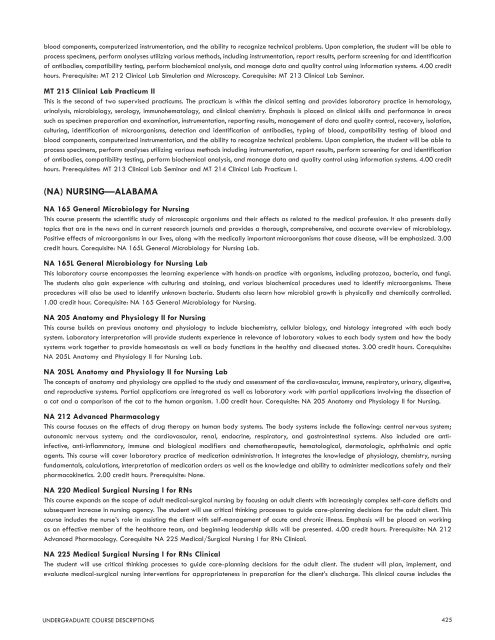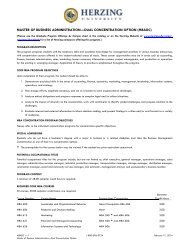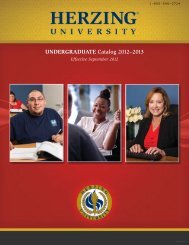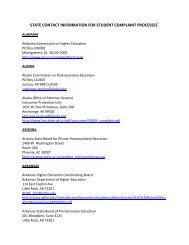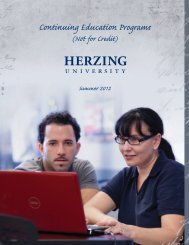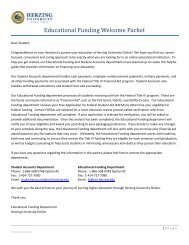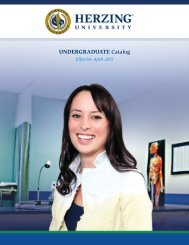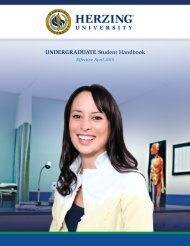Undergraduate - Herzing University
Undergraduate - Herzing University
Undergraduate - Herzing University
Create successful ePaper yourself
Turn your PDF publications into a flip-book with our unique Google optimized e-Paper software.
lood components, computerized instrumentation, and the ability to recognize technical problems. Upon completion, the student will be able toprocess specimens, perform analyses utilizing various methods, including instrumentation, report results, perform screening for and identificationof antibodies, compatibility testing, perform biochemical analysis, and manage data and quality control using information systems. 4.00 credithours. Prerequisite: MT 212 Clinical Lab Simulation and Microscopy. Corequisite: MT 213 Clinical Lab Seminar.MT 215 Clinical Lab Practicum IIThis is the second of two supervised practicums. The practicum is within the clinical setting and provides laboratory practice in hematology,urinalysis, microbiology, serology, immunohematology, and clinical chemistry. Emphasis is placed on clinical skills and performance in areassuch as specimen preparation and examination, instrumentation, reporting results, management of data and quality control, recovery, isolation,culturing, identification of microorganisms, detection and identification of antibodies, typing of blood, compatibility testing of blood andblood components, computerized instrumentation, and the ability to recognize technical problems. Upon completion, the student will be able toprocess specimens, perform analyses utilizing various methods including instrumentation, report results, perform screening for and identificationof antibodies, compatibility testing, perform biochemical analysis, and manage data and quality control using information systems. 4.00 credithours. Prerequisites: MT 213 Clinical Lab Seminar and MT 214 Clinical Lab Practicum I.(Na) NURSING—ALABAMANA 165 General Microbiology for NursingThis course presents the scientific study of microscopic organisms and their effects as related to the medical profession. It also presents dailytopics that are in the news and in current research journals and provides a thorough, comprehensive, and accurate overview of microbiology.Positive effects of microorganisms in our lives, along with the medically important microorganisms that cause disease, will be emphasized. 3.00credit hours. Corequisite: NA 165L General Microbiology for Nursing Lab.NA 165L General Microbiology for Nursing LabThis laboratory course encompasses the learning experience with hands-on practice with organisms, including protozoa, bacteria, and fungi.The students also gain experience with culturing and staining, and various biochemical procedures used to identify microorganisms. Theseprocedures will also be used to identify unknown bacteria. Students also learn how microbial growth is physically and chemically controlled.1.00 credit hour. Corequisite: NA 165 General Microbiology for Nursing.NA 205 Anatomy and Physiology II for NursingThis course builds on previous anatomy and physiology to include biochemistry, cellular biology, and histology integrated with each bodysystem. Laboratory interpretation will provide students experience in relevance of laboratory values to each body system and how the bodysystems work together to provide homeostasis as well as body functions in the healthy and diseased states. 3.00 credit hours. Corequisite:NA 205L Anatomy and Physiology II for Nursing Lab.NA 205L Anatomy and Physiology II for Nursing LabThe concepts of anatomy and physiology are applied to the study and assessment of the cardiovascular, immune, respiratory, urinary, digestive,and reproductive systems. Partial applications are integrated as well as laboratory work with partial applications involving the dissection ofa cat and a comparison of the cat to the human organism. 1.00 credit hour. Corequisite: NA 205 Anatomy and Physiology II for Nursing.NA 212 Advanced PharmacologyThis course focuses on the effects of drug therapy on human body systems. The body systems include the following: central nervous system;autonomic nervous system; and the cardiovascular, renal, endocrine, respiratory, and gastrointestinal systems. Also included are antiinfective,anti-inflammatory, immune and biological modifiers and chemotherapeutic, hematological, dermatologic, ophthalmic and opticagents. This course will cover laboratory practice of medication administration. It integrates the knowledge of physiology, chemistry, nursingfundamentals, calculations, interpretation of medication orders as well as the knowledge and ability to administer medications safely and theirpharmacokinetics. 2.00 credit hours. Prerequisite: None.NA 220 Medical Surgical Nursing I for RNsThis course expands on the scope of adult medical-surgical nursing by focusing on adult clients with increasingly complex self-care deficits andsubsequent increase in nursing agency. The student will use critical thinking processes to guide care-planning decisions for the adult client. Thiscourse includes the nurse’s role in assisting the client with self-management of acute and chronic illness. Emphasis will be placed on workingas an effective member of the healthcare team, and beginning leadership skills will be presented. 4.00 credit hours. Prerequisite: NA 212Advanced Pharmacology. Corequisite NA 225 Medical/Surgical Nursing I for RNs Clinical.NA 225 Medical Surgical Nursing I for RNs ClinicalThe student will use critical thinking processes to guide care-planning decisions for the adult client. The student will plan, implement, andevaluate medical-surgical nursing interventions for appropriateness in preparation for the client’s discharge. This clinical course includes theUNDERGRADUATE Course descriptions 425


